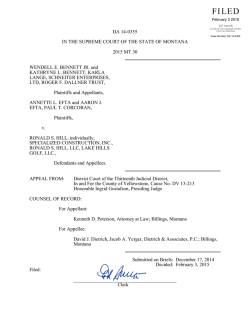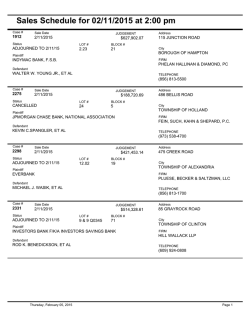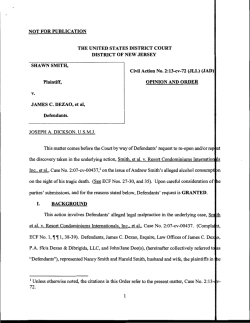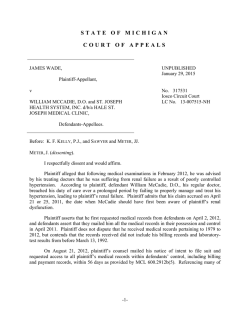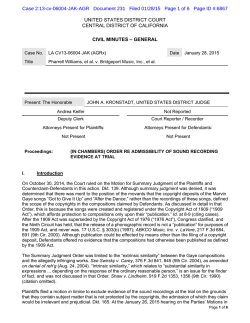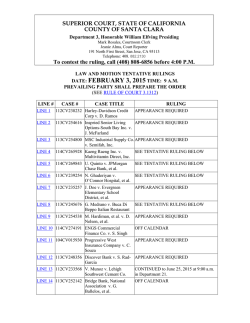
Macon Bank v. Cornblum- Clerical Error in Consent Order
An unpublished opinion of the North Carolina Court of Appeals does not constitute controlling legal authority. Citation is disfavored, but may be permitted in accordance with the provisions of Rule 30(e)(3) of the North Carolina Rules of Appellate Procedure. NO. COA14-631 NORTH CAROLINA COURT OF APPEALS Filed: 3 February 2015 MACON BANK, INC., Plaintiff, v. Swain County No. 11 CVS 225 CAROLYN CORNBLUM and MICHAEL CORNBLUM, Defendants. Appeal by Defendants from orders entered 20 and 30 December 2013 and 17 January 2014 by Judge Gary M. Gavenus in Swain County Superior Court. Heard in the Court of Appeals 6 November 2014. Van Winkle, Buck, Wall, Starnes and Davis, P.A., by Lynn Dee Moffa, for Plaintiff. Shanahan Law Group, PLLC, by John Brandon S. Neuman, for Defendants. E. Branch, III, and STEPHENS, Judge. Factual and Procedural Background This appeal arises from the tortuous legal journey of what is, in effect, a simple collection action. Defendants Carolyn and Michael Cornblum are a married couple who, on 12 October -22007, executed a home equity line of credit agreement in the amount of $250,000.00 in favor of Plaintiff Macon Bank, Inc. After Defendants defaulted on their loan commitments, Plaintiff filed a complaint $255,442.41, plus on 13 interest September and 2011 seeking to fees. Immediately attorney’s recover after the complaint was filed, Defendants, through their former counsel, contacted Plaintiff, stated that they would not contest liability, and agreed to entry of a consent judgment if Plaintiff would agree to reduce the amount of the judgment to $225,000.00. In mid-January 2012, Plaintiff sent a draft consent judgment in the amount of $225,000.00 to Defendants for their execution. While the caption of the document listed both Defendants followed by the designation “Defendant(s),” the body of the proposed consent judgment used the singular “Defendant” rather than the plural “Defendants” in describing the agreement between the parties. about the Defendants never expressed any confusion applicability Defendants. of Defendants, the through consent counsel, judgment did to both request that Plaintiff withhold execution of the judgment for 90 days in order to facilitate a short sale of the subject property. Plaintiff thereupon sent Defendants an amended consent judgment -3containing a provision for a 90-day delay in execution of the judgment. included The the body of singular the term amended consent “Defendant.” judgment again However, both Defendants and their former counsel as “Attorney for Defendants” signed the amended consent judgment and, in early April 2012, returned same to Plaintiff’s counsel. The amended consent judgment was signed by the Honorable Marvin Pope, Superior Court Judge presiding, and entered by the trial court on 23 April 2012. On 19 December 2012,1 Plaintiff received from Defendants a copy of Notice of Right to Have Exemptions Designated, which Defendants had filed with the clerk of court. Both Defendants then to litigated the issue of contended they were entitled. the exemptions which they Following a hearing, the trial court entered an order valuing and designating exempt property in early June 2013. Plaintiff then sought a writ of execution on the consent judgment, and a writ of execution was signed by the deputy clerk of court on 2 July 2013. 1 Nothing in the record before this Court explains the lapse of more than seven months between entry of the consent judgment and the filing of Defendants’ Notice of Right to Have Exemptions Designated. -4In early August 2013, Defendants, acting pro se, filed a notice and motion to recall writ of execution based upon the use of the term “Defendant” rather than “Defendants” in the consent judgment. At a hearing on that motion, Michael Cornblum was the only defendant who appeared. Following that hearing, on 20 September 2013, the clerk of court denied the motion to recall the writ of execution, noting that each defendant had signed the consent judgment and that Defendants’ counsel had signed on behalf of both Defendants as indicated by the designation below her signature as “Attorney for Defendants.” that the clerical use error of “Defendant” and that rather Defendants The clerk ruled than “Defendants” had not was introduced a any evidence that they were prejudiced by the error. In late September 2013, Defendants filed a notice of appeal seeking de novo review of the clerk’s order by the superior court. Defendants did not notice a hearing on their appeal, but rather made filings in the State of California in an attempt to domesticate the consent judgment in that state. On 26 November 2013, Plaintiff filed a motion under Rule of Civil Procedure 60(a) to correct the clerical error in the consent judgment and a motion for sanctions pursuant to Rule of Civil Procedure 11. Following a 13 December 2013 hearing on Plaintiff’s motions and -5Defendants’ appeal, at which Defendant Michael Cornblum appeared pro se and Defendant Carolyn Cornblum did not appear, the trial court denied Defendants’ motion to recall writ of execution, granted Plaintiff’s Rule 60(a) motion to amend the consent judgment such that the term “Defendant” would read “Defendants,” and granted Plaintiff’s motion for Rule 11 sanctions. Defendants then retained appellate notices of appeal from all three rulings. counsel and filed On 2 September 2014, Plaintiff filed a motion with this Court designated “Appellee’s Motion for Rule 34(a) Sanctions” and, by order entered 12 September 2014, that motion was referred to this panel. Discussion All of Defendants’ arguments on appeal are based upon their contention that the use of “Defendant” rather than “Defendants” in the consent judgment was something other than a mere clerical error. We reject this meritless argument. Case law in this State regarding the definition and effect of clerical errors in the names and designation of parties dates back to the nineteenth century. “Names are to designate persons, and where the identity is certain a variance in the name is immaterial. proceedings not Errors affecting or defects substantial in the rights pleadings are to or be -6disregarded at every stage of the action.” Patterson v. Walton, 119 N.C. 500, 501, 26 S.E. 43, 43 (1896) (citations and internal quotation marks omitted). “It is also well established that a name merely misspelled is nevertheless the same name.” Cogdell v. Telegraph Co., 135 N.C. 431, 438, 47 S.E. 490, 493 (1904) (citation and internal quotation marks omitted). Well over one hundred years ago, Justice Douglas of our Supreme Court noted numerous examples in which similar clerical errors had been overlooked to reach the clearly intended meaning of a pleading or statute: “The plural was taken for the singular; the word ‘venue’ for ‘venire’; ‘Dunn’s Mills’ for ‘Dennis Mills’; ‘South’ for ‘North’; ‘final’ judgments for ‘penal’ judgments; ‘ad respondendum’ for ‘ad satisficiendum’; ‘1st Monday in July’ for ‘1st day of July’; ‘4th Monday’ for ‘5th Monday,’ etc.” Russell v. Ayer, 120 N.C. 180, 210, 27 S.E. 133, 140 (1897) (Douglas, J., dissenting) (emphasis added), overruled on other grounds by Kitchin v. Wood, 154 N.C. 565, 70 S.E. 995 (1911). This long- standing concept has recently been reaffirmed specifically as it applies to variations between the singular and plural forms of party designations. See In re P.R., 189 N.C. App. 530, 659 S.E.2d 490 (unpublished), available at 2008 N.C. App. LEXIS 753 (observing that a “trial court’s construction of its third -7conclusion of law in the singular [“juvenile” rather than the correct plural “juveniles”] represents a mere clerical error”), disc. review denied, 362 N.C. 472, 666 S.E.2d 125 (2008). Here, both the complaint and the summonses in the matter designated by file number 11 CVS 225 refer to both Defendants using the plural term individual names. as well as by using each of their The action was an attempt to collect on a home equity loan taken out by both Defendants. In addition, while the consent judgment uses the singular term “Defendant” in its body, both Defendants are individually named in the caption of the judgment, and both Defendants signed the consent judgment, along with their attorney (designated as “Attorney for Defendants”). Defendant. Further, In its order the writ entered of 20 execution September names 2013 each denying Defendants’ motion to recall writ of execution, the clerk of superior court found as fact that, in the hearing before her, Defendants declined to seek a ruling that the consent judgment was not intended to apply to both Defendants and presented no evidence that the clerical error had prejudiced them in any way. All of the evidence before the trial court at the motion hearing, including, inter alia, emails and letters between the parties’ counsel and affidavits from Plaintiff’s counsel, -8indicates that all parties intended for the consent judgment to apply to both Defendants. hearing, parties Defendant intended Defendants. Michael for the In his pro se appearance at the Cornblum consent never judgment disputed to apply that all to both Rather, he contended only that the error in using the singular “Defendant,” even if it was an unintentional error that did not reflect the intent of the parties, still barred Plaintiff from collecting on the judgment. At the hearing, Defendant Michael Cornblum’s entire argument to the trial court on all three motions was the following: Your Honor, as we go back about two years or so, the reason for the discussion of this consent judgment was very simple. My wife and I were in the process of losing our home. [Plaintiff] had a second deed of trust position second to BB&T in a first lien position. In my discussions with BB&T we were exploring the options that they made available to us to limit our personal liability. That included a short sale and that included a deed in lieu of foreclosure. So the only reason there was discussion about a consent judgment — and as Mr. Pinkston [former counsel for Plaintiff] offered up in his affidavit in the material that [counsel for Plaintiff at the hearing] turned in — the only reason that there was discussion of a consent judgment was that in exchange for the judgment, that [Plaintiff] would agree to release the second deed of trust to allow us to effectuate either a short sale or a deed in lieu of foreclosure, -9both of which are designed to limit personal liability on that first deed of trust. A consent judgment was entered into in the form as drafted and prepared and signed by opposing counsel and their client, it was not appealed. Thereafter, when we went back to Mr. Pinkston to say we are now prepared for — to get rid of the home in accordance with BB&T’s offer to us, [Plaintiff] refused. They breached our verbal agreement. Okay. Now, this consent judgment does not allow us to come back in and rework it. The consent judgment says what it says, not what it would have, should have or could have said. So what ended up happening is [Plaintiff] and the Van Winkle Firm [acting as counsel for Plaintiff], Mr. Pinkston breached their agreement. Okay. I’m not in here — I’m not in here trying to claim the consent judgment should be void because they breached an agreement. All I’m doing is defending my rights looking at a consent judgment that says “defendant” and applying the laws of North Carolina to that. And to be accused of harassing — of harassment. What ended up happening is by virtue of them breaching that agreement, it forced BB&T to foreclose on the home in a process that they had to eliminate the second deed of trust through the foreclosure process. And the bid in from that has resulted in personal liability, a shortage on that of about $250,000 of liability on Carolyn and myself that would not have been present if [Plaintiff] hadn’t breached their agreement. So for them to come in now and say that I’m playing games and I’m delaying and I’m -10harassing, is nonsense. I’m defending my position as I have every right to do. In sum, at the hearing, Defendant Michael Cornblum acknowledged that he and Defendant Carolyn Cornblum understood and intended that the consent Defendant Michael understood that judgment Cornblum Plaintiff would apply further would to asserted facilitate a both that of them. Defendants short sale and other actions to prevent a foreclosure on their home by another bank, an arrangement which is not part of and not discussed in the consent judgment itself. After signing the consent judgment, Defendants felt that Plaintiff had failed to fulfill their verbal understanding and decided to use the reference to “Defendant” in the consent judgment to prevent Plaintiffs from collecting on the judgment as a way to get back at Plaintiff for its alleged breach.2 Thus, all of the evidence in the record indicates that the use of “Defendant” in place of “Defendants” in the consent judgment was no more than a clerical error. Accordingly, the trial court did not err in denying Defendants’ motion to recall the writ of execution. 2 We express no opinion as to the truth of Defendant Michael Cornblum’s allegations regarding a breach of promises made by Plaintiff outside the record in this matter. Any alleged breach by Plaintiff regarding any terms or understanding not included in the consent judgment is simply not before this Court. -11In turn, under Rule 60(a), the trial court had the power to correct clerical errors like the one in the consent judgment here. See N.C. Gen. Stat. § 1A-1, Rule 60(a) (2013) (“Clerical mistakes in judgments, orders[,] or other parts of the record and errors therein arising from oversight or omission may be corrected by the judge at any time on his own initiative or on the motion of any party and after such notice, if any, as the judge orders.”). Thus, the trial court did not err in amending the consent judgment to correct the clerical error of using the term “Defendant” rather than “Defendants.” We likewise disagree with Defendants’ argument that the trial court erred in imposing sanctions under Rule 11. The trial court’s decision to impose or not to impose mandatory sanctions under [section] 1A-1, Rule 11(a) is reviewable de novo as a legal issue. In the de novo review, the appellate court will determine (1) whether the trial court’s conclusions of law support its judgment or determination, (2) whether the trial court’s conclusions of law are supported by its findings of fact, and (3) whether the findings of fact are supported by a sufficiency of the evidence. If the appellate court makes these three determinations in the affirmative, it must uphold the trial court’s decision to impose or deny the imposition of mandatory sanctions under . . . Rule 11(a). Turner v. Duke Univ., 325 N.C. 152, 165, 381 S.E.2d 706, 714 (1989). -12The motion to recall was based upon the fact that the consent judgment used the singular “Defendant” while the writ of execution referred to both Defendants. Defendants cited Cornelius v. Albertson, 244 N.C. 265, 93 S.E.2d 147 (1956) and Davis v. Whitehurst, 229 N.C. 226, 49 S.E.2d 394 (1948) for the proposition that a writ of execution cannot be issued against “strangers to a judgment.” discrepancy between the Defendants then asserted that the consent judgment and the writ execution rendered them strangers to the consent judgment. its Rule 11 order, the trial court found that all of of In the evidence was that the use of the singular “Defendant” in the consent judgment was a clerical error and that Defendants intended that the consent judgment apply to both of them, that Defendants were not misled or prejudiced by the error, that the cases cited by Defendants were factually and legally inapplicable, and that the applicable law on clerical errors has been well established for over a century. court’s evidence, findings and of those fact are findings of supported fact in Each of the trial by turn the undisputed supported the court’s conclusion that Defendants’ motion to recall the writ of execution was interposed for improper purposes. Accordingly, -13the trial court did not err in granting Plaintiff’s motion for Rule 11 sanctions. Plaintiff’s Rule 34 Motion Pursuant to Rule of Appellate Procedure 34, Plaintiff moves for imposition of sanctions prosecution of this appeal. against Defendants for the Rule 34(a) permits this Court to impose sanctions on an appellant where “the appeal was not well grounded in fact and was not warranted by existing law or a good faith argument for the extension, modification, or reversal of existing law[.]” N.C.R. App. P. 34(a)(1). In light of the utter lack of evidence that the use of the term “Defendant” in the consent judgment was anything other than a clerical error and the long-settled precedent that such errors are to be disregarded at every stage of the litigation, we also conclude that this appeal was frivolous and taken for an “improper purpose, such as to harass or to cause unnecessary delay or needless increase in the cost of litigation[.]” 34(a)(2). N.C.R. App. P. Therefore, we agree that sanctions are warranted and order that Defendants and their appellate counsel pay the costs and reasonable expenses, including reasonable attorney’s fees, incurred by Plaintiff because of this appeal. 34(b)(2). N.C.R. App. P. -14Conclusion For determination defending court. this appeal, of the Plaintiff’s matter is costs and REMANDED expenses to the in trial The orders of the trial court denying Defendants’ motion to recall the writ of execution, granting Plaintiff’s Rule 60(a) motion, and granting Plaintiff’s Rule 11 motion for sanctions are AFFIRMED. Judges STEELMAN and GEER concur. Report per Rule 30(e).
© Copyright 2026
